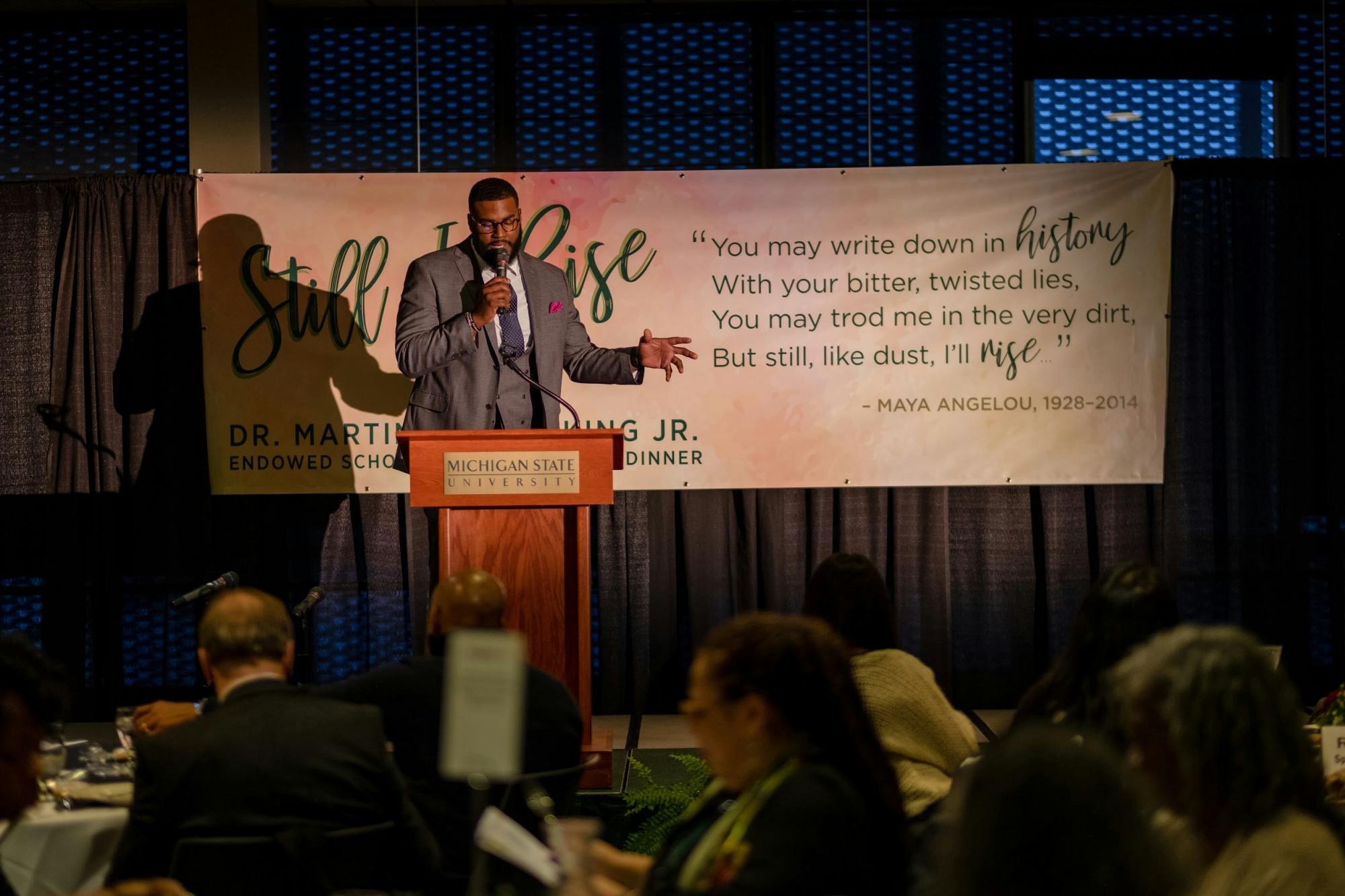To kick off a week-long commemorative celebration of Dr. Martin Luther King Jr., Michigan State University hosted its first in-person annual unity dinner since 2020 on Thursday. Events will continue through Friday, Jan. 20 to honor King’s legacy.
Although it has existed for many years, the 2023 dinner will be the first event for Vice President and Chief Diversity Officer Jabbar Bennett, who began at MSU during the pandemic.
“It’s exciting for me to be able to bring back and celebrate this event in-person for the first time in four years, but also to meet many people on campus who engage in this work, who are advocates and allies in this work that I have not had an opportunity to meet,” Bennett said.
Bennett said an annual celebration of King’s legacy is important not only to honor his work for human rights, but also to reflect on how that work continues today.
“It’s an opportunity for the community to come together around a common purpose, to reflect on work and legacy, specifically of Dr. King, but also to think about and acknowledge the work that is happening today,” Bennett said. “And how there’s still a need for it in different areas, and how we can encourage and partner with one another to actually get that work done.”
The 43rd Annual Dr. Martin Luther King Jr. Community Unity Dinner will feature African American and African Studies associate professor Dr. LeConté Dill as a keynote speaker. Dill is trained in public health and ethnography, and described her work, which focuses on the lives of young, urban black girls and youth of color, as transdisciplinary.
A major part of Dill’s personal connection to King stems from attending Spelman College in Atlanta, the sister school of King's alma mater – Morehouse College. Dill said it is important to remember King for the way he lived, not just how he died.
“Dr. King is important for not just our country but our world,” Dill said. “[He is] definitely an important leader for Black people, but also an important leader for all people. Just based on his commitments to justice, his commitments to liberation, his commitment to studying.”
In her unity dinner speech, Dill will focus on King’s 1967 “Where Do We Go From Here?” speech. She said her speech will center around power and how marginalized people can use their power to create change – a sentiment that is echoed in King’s speech.
“People who systematically don’t have the most power, that doesn’t mean they don’t have any power,” Dill said. “I will try in my speech to talk about the different types of power that even the most marginalized, minoritized people have, that they can leverage for change. [King] talks about when you properly understand this power, that’s what’s really going to lead to change and lead to you achieving your purpose.”
On Friday, the MLK Student Committee and the Office of Spartan Experiences will host the MLK Student Leadership Conference. Graduate student committee chair Ladell Watson is in charge of several aspects of the conference, which will feature author and school psychologist Kelsie Reed as a guest speaker.
“We’ll be learning from [Reed’s] book, and different ways in which she produces work, how it relates to Dr. King’s mission,” Watson said. “Also providing opportunities and tools for [students] to do a self-reflection for themselves, but also reflection on how their work can ultimately support both campus life and their own student development.”
Undergraduate student committee chair Brandon Foster has worked primarily in setting up the MLK Commemorative March, which will take place on Monday, Jan. 16. The march will start at Beaumont Tower at 9 a.m. and end at the proposed location for the new MSU Multicultural Center.
“It was very important for us to walk there because we are finally getting a place where people that are different can be comfortable,” Foster said. “We’ve been fighting for that for decades now. I’ve talked to alumni from the 90s that were like ‘we really wanted this’ and we’re finally getting that.”
The march is hosted by the student committee in collaboration with Foster’s fraternity, Alpha Phi Alpha. Foster said his fraternity will always continue to honor King, who was also a member.
“Just look at our school right now,” Foster said. “Without Dr. King’s legacy, we wouldn’t be able to coexist in these types of spaces. He’s one of the reasons there’s a lot of diversity, equity, inclusion to me because he really brought those aspects together.”







